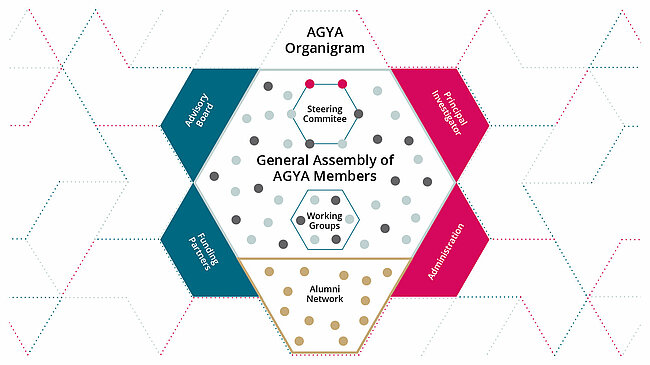Organisation & Self-Governance
Organigram
At the centre of AGYA is the General Assembly of all AGYA members from the Arab World and Germany. Members join after five years of membership the growing AGYA Alumni Network. The Advisory Board of high-profile representatives of Arab and German research institutions supports AGYA‘s academic work and strategic networking.
General Assembly
AGYA is independent with respect to the content and forms of its academic activities. The members themselves implement the organizational structure of the academy in a bottom-up approach:
All AGYA members meet twice a year – once in Germany and once in an Arab country – for a General Assembly to democratically decide on the academy’s matters as well as their next research topics and collaborative projects. Members organize the activities of the academy and develop its framework in dedicated Task Forces. These address specific topics, such as the constitution of AGYA and the selection of new members.
The General Assemblies serve as an opportunity for members to meet, present their current research and discuss their next projects, receive feedback and constructive input from their fellow members, and engage in an exchange with high-ranking external experts.
The assemblies of the Annual Conferences are accompanied by public keynote lectures and panel discussions on topics relevant to both the Arab world and Germany, tailor-made trainings, and thematic excursions. Taking place in different countries and cities, the General Assemblies permit the establishment of new research infrastructures between different Arab countries and Germany and the consolidation of existing academic and research exchange. In this way, AGYA encourages and strengthens North–South–South cooperation.
Steering Committee
The Steering Committee manages the activities of AGYA. It consists of three Arab and three German members of AGYA, who are elected by the General Assembly for one year. One Arab and one German member of the six-person Steering Committee are elected to serve as Co-Presidents. Together with the other four members of the Steering Committee, they regularly represent AGYA at international conferences and actively engage in exchange with leading academic institutions in the Arab world and Germany.
Working Groups
AGYA members have currently established six Working Groups so far, which address the following topics: Arab and German Education; Common Heritage and Common Challenges; Energy, Water and Environment; Health and Society; Innovation; and Transformation. Each Working Group conducts periodic meetings throughout the year in which its members develop joined interdisciplinary projects related to the working group topic. These meetings are often combined with workshops, conferences or other scientific activities.
Within the Working Groups, the members form strong ties to each other across disciplines and geographical background. Next to the General Assemblies, they are the first point of entry into AGYA, providing orientation to new members. Working Groups manage their own affairs, debate the important issues in their fields, and interact intensively. Working Group projects include a substantial number of Arab and German scholars from diverse research areas. This is where AGYA’s interdisciplinary approach is put into practice.
Alumni & Alumnae
AGYA alumni/alumnae are part of the AGYA family – for a lifetime. They actively engage in supporting and promoting AGYA. The first generation of AGYA members became alumni/alumnae in 2018.
They play an essential role in the AGYA network of excellence consisting of outstanding scientists and high-ranking partners from universities and research institutions in the Arab World and Germany.
At least once a year, the alumni/alumnae can reunite at the AGYA Alumni Summit in conjunction with the AGYA Annual Conference to meet the current AGYA members. Alumni/Alumnae conduct their own interdisciplinary research projects and collaborative initiatives within the framework of the academy.
As AGYA ambassadors, the alumni/alumnae expand and sustain cooperation across disciplines in their respective regions. They promote the academy and coordinate regional alumni meetings where AGYA research projects are presented to a broad public. AGYA alumni/alumnae also support the dissemination of the annual Call for Membership by identifying and encouraging promising young researchers in the Arab World and Germany to become future generations of AGYA members.
Advisory Board
AGYA is supported by an Advisory Board composed of high-ranking Arab and German representatives of internationally renowned academic institutions. The AGYA Advisory Board meets at least once a year. The Advisory Board members support the academy especially through strategic networking and fundraising across their regions. Following a public call for membership and a highly competitive selection process, the Advisory Board is responsible for the final selection of the AGYA members. At AGYA Annual Conferences the Advisory Board Members contribute with inspiring keynote lectures and use the opportunity to exchange with AGYA members and alumni/ae.
Principal Investigator
The Principal Investigator (PI) is the interface between AGYA and the German Federal Ministry of Education and Research (BMBF) and all other cooperation partners. At the Berlin-Brandenburg Academy of Sciences and Humanities (BBAW), the PI heads the administration of AGYA and is responsible for financial affairs. The PI represents and pools the interests of AGYA in academia and science diplomacy. Together with the AGYA Advisory Board, the PI develops the network rollout strategy for the Arab countries and Germany.
Administration
AGYA’s administrative team effectively promotes the academy’s activities and member-led projects through professional science management. The office in Germany at the Berlin-Brandenburg Academy of Sciences and Humanities (BBAW) is the members’ first address for the support of their research projects. The team is also responsible for AGYA’s public relations.
The counterpart to the Berlin office is the regional office in Cairo at the Academy of Scientific Research and Technology (ASRT), which supports AGYA projects and PR in Egypt, Sudan, and the Gulf countries. It also has regional coordinators in Beirut and Tunis who act as regional focal points.
